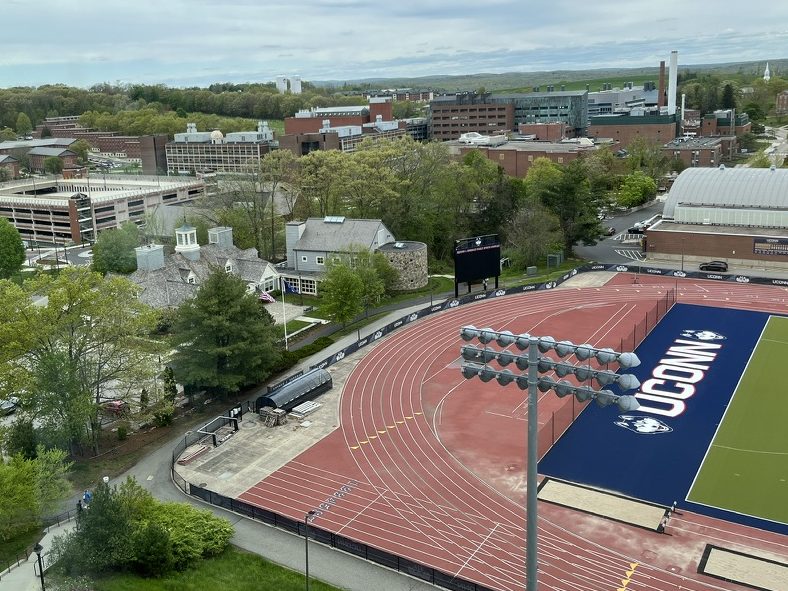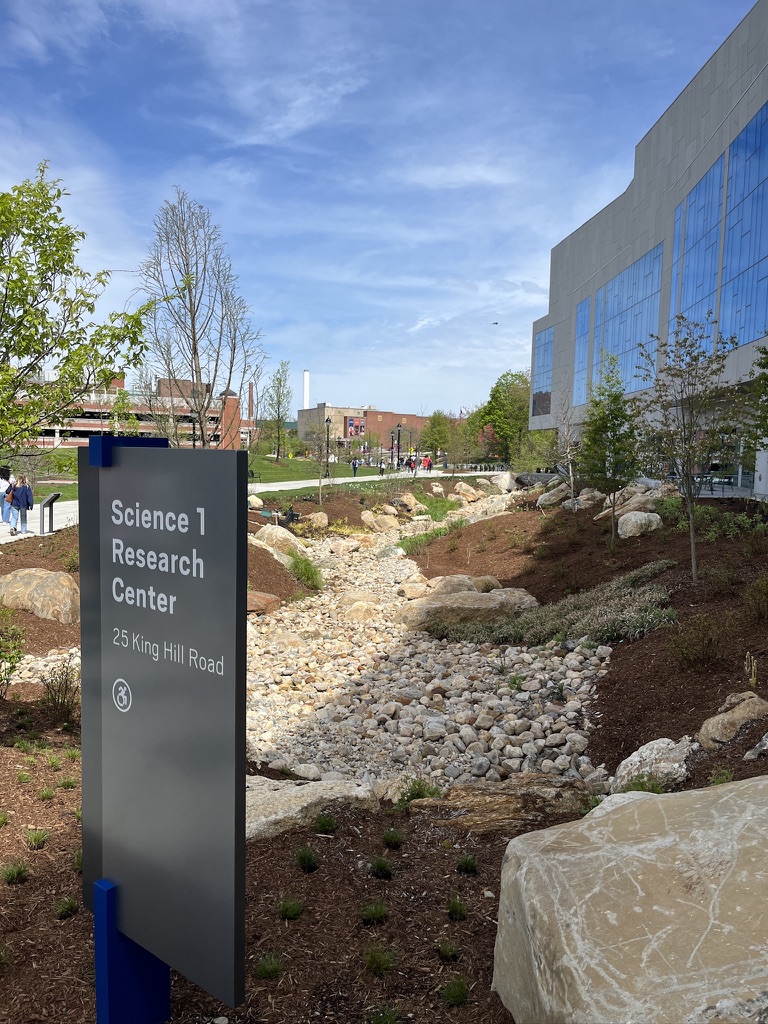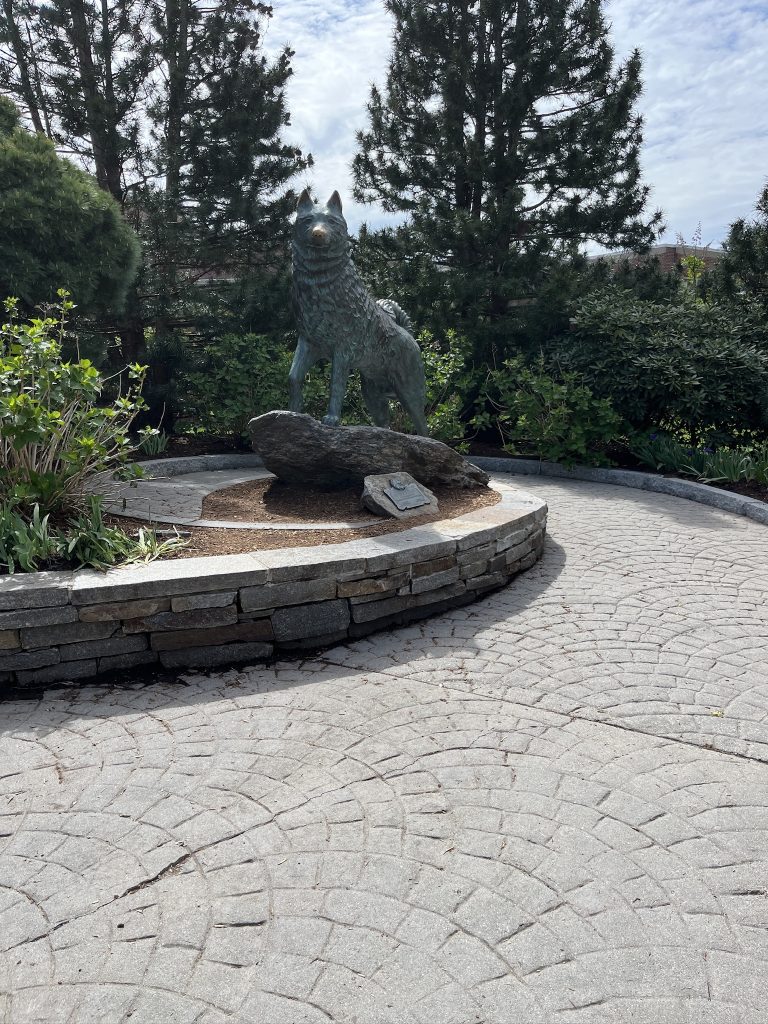UConn’s first-year programs ease transition to college
Hott off the Press by Karen A. Hott, May 2024

At “the basketball capital of the world,” University of Connecticut welcomes new students into the Husky pack with programs that ease the transition to college and make a large school feel much smaller.
“How do I discover this place and make it work for me?”
The First Year Experience (FYE) program, attended by 90% of freshmen, answers the question “How do I discover this place and make it work for me?” FYE provides an embedded support system for cohorts of no more than 20 students, who meet for seminars with an instructor and peer mentor. The 90% retention rate (freshman to sophomore) indicates FYE is working.
Along with FYE, students can participate in learning communities, the Academic Achievement Center, and innovation spaces to make them feel like an integral part of the UConn community. These programs and spaces work together to fulfill five goals:
- *personalize the student experience
- *build caring communities
- *disaggregate populations to meet unique needs
- *create a culture of support; help students overcome challenges and barriers
- *incorporate what’s happening on campus into school activities, blending co-curricular and academic experiences
First Year Experience, Learning Communities, Academic Achievement Center
The second important element of creating connections at UConn: learning communities. Nearly half (44%) of incoming freshmen join a residential learning community based upon affinity, major, or program (for example: ScHOLA2RS House in support of Black males, Nursing House, or Public Health House).
In addition to FYE and learning communities, students are supported through the Academic Achievement Center. The center helps students “get the grades they want” through strategic academic counseling, drop-in coaching, strategies for deeper learning, workshops, and supplemental instruction (led by a student who goes to class again to be a content coach in the evening).
Five campuses, one diploma
Storrs houses the main campus, one of five sites, all of which produce a University of Connecticut diploma. It’s common to begin on a satellite campus and relocate to Storrs after acquiring 54 credits; this is a “campus change,” not a transfer. You can begin and end at any campus. On your application you choose a first and a second preference of campus. Storrs offers plenty of cows but little in the way of a town; the “downtown” is more an extension of the official UConn, but there’s plenty to do on campus. In fact, admissions would argue that the rural setting impels students to get involved on campus.

You apply to the school or college rather than to the university as a whole. Nonetheless, 25% of students start out in exploratory studies.
UConn comprises undergraduate schools of fine arts; education; nursing; pharmacy, and business; and the colleges of agriculture, health and natural resources; liberal arts and sciences; and engineering. Top jobs for Huskies are financial analyst, marketing coordinator, nurse, and mechanical engineer.
Accelerated programs
Twelve special programs can accelerate your pathway to a master’s via 4 + 1, 3 + 2, 5th Year, or Fast-Track. For example, in five years, you can earn an accelerated master’s in engineering (4 + 1 BS/MS), in business analytics and project management, in education (integrated bachelor’s/master’s in 5), in political science (5th Year MA), or in athletic training (3 + 2 BS/MS). Special programs in law, medicine, and dentistry require that you apply by Nov. 15. UConn also has graduate schools for pharmacy, law, and social work.

This year, in forming a freshman class of 4200 for the school of 19K undergraduates, UConn had 56,000 applications to read. The acceptance rate in 2023 was 55%. UConn has honors scholar programs within departments, but also a university honors laureate program with 550 Huskies enrolled. The student-to-faculty ratio is a respectable 16:1.
Great support for transition
Thanks to the enthusiastic presentations by First Year Programs executive director David Ouimette and Director of Academic Support Leo Lachut (“I help students get the grades they want”), I would put UConn on the list for any student who could benefit from the attentive support given to new students. UConn has formal structures in place—First Year Experience, Learning Communities, and academic support—to help students make the enormous transition from high schooler to college freshman.